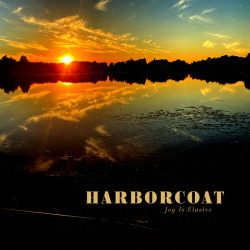From Lansing, Michigan, Harborcoat’s second album is a solid collection of Americana-infused heartland rock.
 Originally created in 2016 as a vehicle for Matthew Carlson’s songwriting, Harborcoat was intended to be a home for more personal songs that he didn’t feel fitted so well with his existing power-pop band, The Stick Arounds. As a long-time R.E.M. fan, Carlson named the project after the opening track of R.E.M.’s second album, Reckoning.
Originally created in 2016 as a vehicle for Matthew Carlson’s songwriting, Harborcoat was intended to be a home for more personal songs that he didn’t feel fitted so well with his existing power-pop band, The Stick Arounds. As a long-time R.E.M. fan, Carlson named the project after the opening track of R.E.M.’s second album, Reckoning.
Given the choice of name, the influence of the Athens, Georgia supergroup is to be expected, but alongside the trademark jangling guitars and vocal harmonies, the Lansing band draw on a wide range of influences, with Carlson citing Billy Bragg as a particular inspiration. The songs have an emphasis on similar narrative themes you’d hear in Springsteen’s work or from bands like The Hold Steady, and Carlson himself characterises the Harborcoat material as being, “Stories with chords.”
“On this record I wanted to write more intently about all of our unseen struggles and the baggage we travel with each day,” says Carlson. “There is a greater thread lyrically and musically rooted within the themes of the album and the fictional town in which they occur. As much as I cringe at the idea of a concept record, this is a record with a pretty clearly defined concept.”
The music is classic indie rock and there’s something in guitar work and in Carlson’s vocals that brings to mind some of the great Australian bands of the 1980s and 90s, like The Triffids, Died Pretty or The Church. There’s also an admirable DIY ethic behind the whole enterprise, with the album self-produced by the band, and released on Carlson’s own label.
That Australian alt-rock sound is apparent in the bright, jangling opening chords and in Carlson’s vocal of the opening track, ‘Always Better‘. There are some nice big guitars and excellent vocal harmonies on the next track, ‘Transit Town.’ Track three, ‘Go to Sleep,’ has a bit more piano in the mix, but still plenty of excellent guitar work, and more layers of these lovely vocal harmony hooks that are spread across the whole album. The remaining nine songs maintain the high standard of the opening tracks and while the tempo and intensity change enough to keep things interesting, the quality of songwriting remains consistent. Carlson’s has a strong voice that has some of the same ‘edge of the note’ quality as Billy Bragg, giving it a relatable and distinctive character. The musicianship across the board is great but these harmony vocals give an especially pleasing lift to almost every track.
The album was recorded at Carlson’s family cabin shortly after his father died suddenly, but family and friends convinced him to proceed with the sessions. “That week of recording was the first time in four weeks that I had managed to find any degree of happiness or hope,” he recalls. “It was cathartic, it was beautiful, and it was the perfect distraction.” The family were right to encourage him to push on. ‘Joy is Elusive‘ is a worthy tribute.


